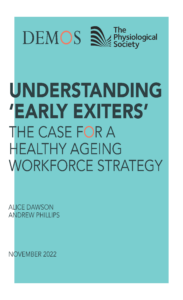Age, health and work
Our new report launched in the Houses of Parliament on 2 November 2022, has been published in collaboration with thinktank Demos
and The Centre for Ageing Better.
DOWNLOAD OUR REPORT
‘Understanding ‘Early Exiters’: The case for a healthy ageing workforce strategy’

Professor Philip Atherton on why an Ageing Workforce strategy is important
Carole Easton CEO of The Center for Ageing Better on the importance for everyone of an Ageing Workforce Strategy
Watch the Ageing Workforce Strategy report launch highlights and interviews
Why do older people stop working?
Since the start of the COVID-19 pandemic in 2020, the UK has experienced what some have called an ‘exodus’ of over 50s from the labour force. An increasing number of older people are leaving work before state pension age and becoming economically inactive – neither in work nor actively searching for work. International comparison shows that this trend in the UK is unusual: no other high-income country has seen a comparable sustained rise in over 50s remaining economically inactive since the start of the pandemic. The phenomenon of ‘Early Exiters’ is a very British one.
Poor health is one of the main drivers of this rise in economic inactivity among the over 50s. Compared to before the pandemic, there are around 100,000 more people aged 50-64 who say they are not in work because of a long-term health condition. There are a wide range of health conditions which are affecting people, both physical and mental.
This trend has serious consequences for the UK economy. A rise in economic inactivity among over 50s has contributed to high vacancies and labour shortages during 2022. This will hold back economic growth in the UK, an objective which both the government and the opposition have said will be central to policy making in the years ahead. Long-term demographic changes mean that, should it continue, this issue will become even more important as the UK’s population ages in future decades. Reducing the link between ageing and ill health will be crucial for the UK’s long-term prosperity and physiological insight and research has a key role to play.
Physiology has already played a valuable role in demonstrating the impact of interventions such as physical activity, diet and sleep for preventing or slowing down age-related decline in health. For example, physical activity can help people maintain cardiovascular health and higher levels of muscular capacity as they grow older.
As part of the Ageing Workforce Strategy, we recommend that the UK takes the opportunity to harness scientific research to weaken the link between ill health and older age by investing in relevant medical and physiological research on healthy ageing and longevity. The UK is well placed globally to help lead this work, and “advancing the medical science and understanding of ageing” has been identified as a key area in the government’s existing Life Sciences Vision.
KEY RECOMMENDATIONS
- Older people with health conditions should be supported to continue working
– The government should work with employers to improve access to occupational health services by removing the cost barriers for small and medium sized enterprises
– Occupational health providers and employers should aim to improve the quality of occupational health services by delivering continuity of care between professional and individual, and producing simple evidence-based employer guidelines for older people, rooted in the latest physiological and behavioural evidence. - Older people with health conditions should be helped to return to work
– The government and employers should ensure job design and recruitment practices are age-inclusive and accessible to older people with health conditions.
– The government, NHS England, regional and local tiers of government and employment support offer tailored support to older people rooted in medical and physiological evidence that will help those who want to return to work to do so. - Medium-term prevention should be achieved by improving the quality and design of work and the workplace so that they support older workers’ health
– The government and employers should work together to integrate promoting healthy lifestyles into employers’ policies to help prevent ill health and support healthy ageing. - Long-term prevention should be achieved by improving public health over the course of people’s lives, and by advancing scientific research, including physiological research, on ageing
– The UK government and research funders should invest more in scientific research on ageing, establishing a centre to coordinate UK and international research on healthy ageing. This would strengthen the medical and physiological evidence base required to weaken the link between ill health and older age, improve understanding of the underlying biology of ageing and increase effectiveness of interventions.
Steering Group Members
Economic inactivity, health and older workers roundtable
The ‘exodus’ of over 50s from the labour force following the COVID-19 pandemic has shone a light on the longstanding impact of poor health on the economic activity of older workers.
The UK Government has also recognised this issue of older workers leaving the workforce due to ill health. In his Autumn Statement, the Chancellor noted that the Department for Work and Pensions (DWP) would be launching a review into the causes of economic inactivity and over Christmas, a number of national newspapers ran articles about a so-called ‘Midlife MOT’ being proposed by the Prime Minister and the Secretary of State for the Department for Work and Pensions which would assess finances and opportunities for work for those aged over 50 years.
The Physiological Society convened a group of stakeholders with an interest in work and older people to discuss how we can support those that are currently unable to work as a result of poor health and discuss examples of best practice in the retention and recruitment of older workers. The roundtable was held on 23 January 2023 and representatives from the following organisations were in attendance:
- University of Birmingham
- Confederation of British Industry (CBI)
- Centre for Ageing Better
- Demos
- Department for Work and Pensions
- Faculty of Occupational Medicine
- University of Portsmouth
- Reed in Partnership
- University of Westminster
- UK Research and Innovation (UKRI)
Following the discussion, The Society developed a summary note with key policy recommendations for the DWP to consider as a part of their review.







